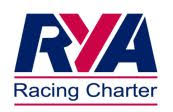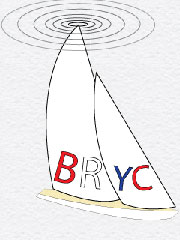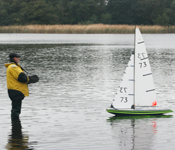Racing Rules at the BRYC
www.finckh.net The “Rules Game” – possibly the best way to learn.
All racing at the Broads Radio Yacht Club is conducted according to the ‘World Sailing - Racing Rules of Sailing – Appendix E. Radio Sailing Racing Rules’ and in accordance with the
As with any competitive sport it is necessary to have rules to ensure fair competition and to prevent those who might be so disposed from gaining an advantage from overly aggressive or unfair tactics. The basis of all good sailing is gentlemanly conduct, good sportsmanship and fair play; cheating (i.e. trying to gain an advantage by deliberately breaking a rule) is unacceptable.
Of course everyone makes mistakes from time to time and someone breaking a rule can usually exonerate him or herself by taking a penalty promptly after the incident. The penalty is usually a complete turn of the boat to include one tack and one gybe. Contact between boats is against the rules and even when you have right of way or the right to room you must try to avoid contact with another boat.
Racing a sailing boat is about much more than just sailing fast and has often been likened to ‘Chess on Water’ as skippers try everything within the rules to gain a tactical advantage and try to anticipate what is likely to happen far in advance; it is this challenge that makes it so addictive, worthwhile and rewarding.
Fortunately it isn’t necessary to learn all of the rules in detail before you can race and you will be able to get by quite well by knowing just a few; here is Lester Gilbert’s idea for ten rules to get you started taken from his excellent website - Lester Gilbert’s Radio Sailing http://www.onemetre.net/
Ten Racing Rules for Radio Sailing
| 1 | Port keeps clear of starboard |
2 |
Windward keeps clear of leeward |
3 |
Astern keeps clear of a boat ahead |
4 |
Keep clear while tacking or gybing |
5 |
When you gain right of way, or when you change course, give other boats time to keep clear |
6 |
Give room to (all) the inside boat(s) to round the mark |
7 |
Give room to a boat avoiding an obstruction |
8 |
Do not barge in at the start |
9 |
If you have violated a rule, take a penalty; and don't wait to be called |
10 |
It is better to give way and avoid a collision, or take a penalty, than to protest |
As time goes by most skippers become so enthusiastic they want to learn the rules in more detail and there are many good books on the subject, here are a few suggestions;
“The Rules Book Complete 2017 – 2020 by Eric Twiname Revised by Brian Willis. This is probably the most readable book available and very suitable for those new to the sport.
“2017 – 2020 The Rules in Practice” by Brian Willis. This is a very popular book, with good explanations of the most likely scenarios.
“Paul Elvstrom explains The Racing Rules of Sailing 2017 – 2020 Rules”. A very complete book with a very detailed explanatory section and another section giving the ‘World Sailing’ (formally ISAF) Interpretations of the Rules as decided by Protest Committees at International events.
These books and many others on sailing matters are all available from; www.sailingbooks.co.uk www.rya.org.uk and other good book sellers. The rules are revised after each Olympic Games so make sure that any rule book you buy or read is for the period 2017 – 2020 or you may be learning rules which are out of date.
In addition to learning from books and on the water there is a very good “Rules Game” available on line at www.finckh.net . and this is quite possibly the best way of all to learn the rules.
Peter Sutton - September 2017


